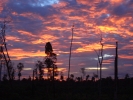
Asia Pulp & Paper (APP) has been accused of a double default on international creditors, after an investigation revealed that the company has decimated tropical forests it promised to conserve under legally binding debt restructuring agreements.APP Default on Environmental Covenant, a new report from Sumatra NGO coalition Eyes on the Forest, shows that the company in 2004 agreed to protect high conservation value forest under debt restructuring agreements it made with taxpayer-backed financial institutions in nine countries. The debt restructuring agreements were negotiated after APP in 2001 defaulted on a massive $US13.9 billion of debt and was delisted by the New York and Singapore stock exchanges.
The 2004 agreements covered the restructuring of $6 billion in debt to the taxpayer-backed export credit agencies of Germany, Japan, France, Austria, Sweden, Finland, Italy, Spain and Denmark. Under the agreement, APP' part of the giant Sinar Mas conglomerate - also promised to be fully sustainable by 2007, something it defined as producing all pulp exclusively from plantation wood. The company described the agreements as a legally binding contractual obligation.
The Eyes on the Forest investigation shows that 2007 was the year APP's wood suppliers began clearing the very areas of high conservation value forest in central Sumatra's Pulau Muda that had been highlighted by APP as an example of a new scientific basis for the sustainable development of our plantations and the management of our conservation areas.
Despite APP's praise for the independent mapping of the high conservation value forest in the Pulau Muda rainforest, our analysis of recent satellite imagery shows a third of the identified 34,000 hectares has now been drained and cleared said Muslim Rasyid, co-ordinator of Jikalahari (Forest Rescue Network Raiu), a member of Eyes on the Forest.
Much of this clearing was legally questionable on other grounds, being on peat of more than four metres deep which when drained gives off colossal carbon emissions.
Even in legally binding agreements with government-backed credit institutions around the world, APP has demonstrated that its promises cannot be trusted said Rod Taylor, Director of WWF International's Forest Programme.
In just the last couple of months, it's been revealed that APP and affiliates have cleared inside a self-declared tiger sanctuary, that the company has made claims about sustainability certifications that its certifiers reject, and that protected timber species are present in supplies to its pulp mills.
APP has missed self-imposed deadlines of 2004, 2007, and 2009 of supplying its pulp mills exclusively from renewable plantation wood. An announcement it would finally fulfil this promise by 2015 was recently amended to a new deadline of 2020 when there is a risk there will be little forest left in Sumatra. Eyes on the Forest calls on the ECAs and other investors to not finance APP's plans to expand existing or open new pulp and paper mills in Indonesia, in China and around the world.
The Eyes on the Forest investigation shows that 2007 was the year APP's wood suppliers began clearing the very areas of high conservation value forest in central Sumatra's Pulau Muda that had been highlighted by APP as an example of a new scientific basis for the sustainable development of our plantations and the management of our conservation areas.
Despite APP's praise for the independent mapping of the high conservation value forest in the Pulau Muda rainforest, our analysis of recent satellite imagery shows a third of the identified 34,000 hectares has now been drained and cleared said Muslim Rasyid, co-ordinator of Jikalahari (Forest Rescue Network Raiu), a member of Eyes on the Forest.
Much of this clearing was legally questionable on other grounds, being on peat of more than four metres deep which when drained gives off colossal carbon emissions.
Even in legally binding agreements with government-backed credit institutions around the world, APP has demonstrated that its promises cannot be trusted said Rod Taylor, Director of WWF International's Forest Programme.
In just the last couple of months, it's been revealed that APP and affiliates have cleared inside a self-declared tiger sanctuary, that the company has made claims about sustainability certifications that its certifiers reject, and that protected timber species are present in supplies to its pulp mills.
APP has missed self-imposed deadlines of 2004, 2007, and 2009 of supplying its pulp mills exclusively from renewable plantation wood. An announcement it would finally fulfil this promise by 2015 was recently amended to a new deadline of 2020, when there is a risk there will be little forest left in Sumatra. Eyes on the Forest calls on the ECAs and other investors to not finance APP's plans to expand existing or open new pulp and paper mills in Indonesia, in China and around the world
WWF urges taxpayers to tell their export credit agencies to stop supporting the destruction of Sumatran and other tropical forests and driving elephants, tigers and orang-utans to local extinction said Nazir Foead, Conservation Director WWF-Indonesia.
This is a company that defaulted on its debts and defaulted on the environmental covenants it agreed to as a condition of restructuring its debts. Any support to its plans to expand risks history repeating itself, with any new pulp mills adding to the over-capacity driving the assault on Sumatra's natural forests and wildlife.
This is not a business model that should be financed by any prudent financial institution or investor for replication in Borneo, Papua or anywhere else.



